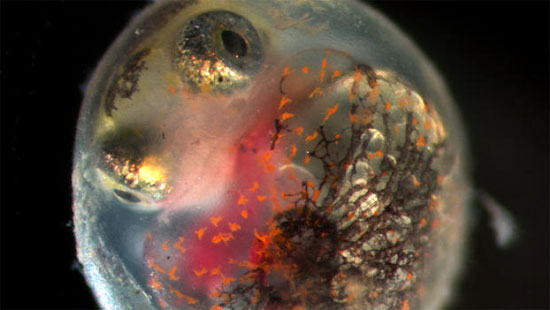The Deepwater Horizon oil spill causes fish defects
(Scientists have recently discovered fish that have defects, three years after the Deepwater Horizon oil spill.
The toxicity of crude oil continues to exert a strong influence on marine fish species, at least more than a year after the occurrence of the oil spill in the Gulf of Mexico, according to new research results conducted by a group. The study included scientists at the University of California, Davis.
Together with researchers from Louisiana and South Carolina, the researchers found that killifish embryos exposed to sediments from the oil-contaminated area in 2010 and 2011 had abnormalities in the process. growth, including heart defects, slow growth and reduced hatching rates. Killifish is an environmental indicator, often used to predict exposure and health risks.
These findings are posted online in the journal Environmental Science and Technology, which is part of a collaborative effort to monitor the impact of the Deepwater Horizon oil spill on fish populations. killifish in the Gulf of Mexico in areas of Louisiana, the area receives a large amount of oil of the incident.
Other organisms share the habitat with Mexican Gulf killifish, such as red salmon, spotted salmon, halibut, blue crab, shrimp and oysters - are also at risk of similar effects.

'These effects are characteristic of crude oil toxicity' co-author Andrew Whitehead, an assistant professor of environmental toxicology at UC Davis. "It is important that we observe the toxicity of crude oil in the context of the Deepwater Horizon oil spill because it tells us that it is too early to say that the effects of this spill have been known and not important". By definition, impacts on reproduction and development - impacts that can affect quantity - will take time to be able to manifest.
The killifish lives abundantly in coastal marshy environments along the Gulf Coast. Although they are not commercially valuable, they are a fish that provides important food for other species and is a major member of this Gulf ecological community. Because they do not migrate, assessing their health will be an indicator of the environment in which they live, making them an ideal object to study.
The researchers collected killifish from oil-contaminated sites at Isle Grande Terre, La., And monitored them to assess their exposure to crude oil. In the lab they also studied killifish embryos exposed to sediments from oil-contaminated sites at Isle Grande Terre in Barataria Bay in Louisiana.
'Our research results show that the development of these fish in those areas may be compromised' , Benjamin Dubansky, the lead author of the study, who has just received a doctorate at the University Louisiana State University said.
Whitehead said the results of the report predict long-term effects on killifish populations. However, the oil from the Deepwater Horizon rig sink occurred only in plaques, not covering the entire coast. That means some killifish are heavily affected by spill, while others are less affected. They believe that healthier and less impacted killifish may reduce the effects of spill on both killifish populations.
The research was funded by the National Science Foundation, the Gulf of Mexico Research Initiative and the National Institutes of Health.
Other researchers in the study are Fernando Galvez, associate professor of biological sciences at Louisiana State University, and Charles D. Rice, professor of biology at Clemson University in Clemson, South Carolina. Researchers have been monitoring the impact of oil on killifish since the Deepwater Horizon oil spill occurred in April 2010.
- The Deepwater Horizon oil spill greatly affected coral populations
- New discovery of oil spill disaster
- Gulf of Mexico: One year after the oil spill disaster
- Terrifying consequences from the largest oil spill in history
- The century oil spill still has consequences
- Use bacteria to overcome oil spills
- Amazing scientific findings in the Gulf of Mexico
- Serious poisoning because of seawater containing oil spills
- The fish is genetically modified for the Gulf of Mexico oil spill
- The image of the terrible environmental destruction in the world
- Blocking oil spill disaster with magnets
- Oil spill threatens the French nature reserve
 Surprised: Fish that live in the dark ocean still see colors
Surprised: Fish that live in the dark ocean still see colors Japan suddenly caught the creature that caused the earthquake in the legend
Japan suddenly caught the creature that caused the earthquake in the legend A series of gray whale carcasses washed ashore on California's coast
A series of gray whale carcasses washed ashore on California's coast Compare the size of shark species in the world
Compare the size of shark species in the world